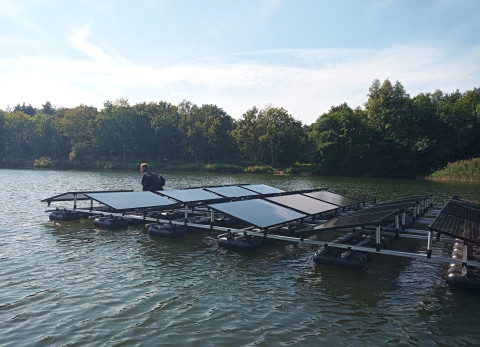Consortium investigates nature-inclusive use of floating solar panels

Consortium investigates nature-inclusive use of floating solar panels
Press inquiries
The Dutch Research Council (NWO) has awarded more than 2.8 million euros to a consortium led by NIOO's Sven Teurlincx that will investigate the use of floating solar panels. The consortium of scientists together with public and private partners aims to establish the technological, ecological and social conditions for floating solar energy to have a sustainable future - for people as well as nature, in different landscapes.
"The transition from fossil fuels to green energy is essential if we are to stop climate change and preserve worldwide biodiversity, but also to guarantee the Netherlands' local energy production" says the main applicant on behalf of the consortium, NIOO researcher Sven Teurlincx. "Without upscaling solar energy, we will never be able to achieve this."
To spare scarce space on land which could be used for agriculture or housing, deployment of solar panels on water is currently being considered. But the environmental effects of floating solar panels have not yet been fully mapped, and policy and legislation in this area is still in development.
"Can floating solar panels provide enough energy, do they really contribute to a greener world, what are the local effects for plants and animals, is the current design the best option...or should we choose another design that would be more viable?"
Building bridges
The SPARKLES-consortium, says Teurlincx, hopes to answer many of these questions through an interdisciplinary approach in which energy science, ecology and public administration work together. SPARKLES stands for ''SPARKing a nature-positive future of floating solar for humans and nature across LandscapES'.
"We're trying to build bridges. Something we've seen in projects that we worked on in the past, is that if you talk to people from different fields, there's often a wealth of ideas and opportunities for doing things better. But we've also had to admit that we really don't speak each other's language.
That's why getting all these different partners on board is "an important first step", according to Teurlincx.
Breakthrough
The consortium is putting nature front and centre in its approach. "The technical system - the solar park - has an ecological impact of course, but standards for ecological water quality can also be incorporated in the design to make it nature-inclusive. Social aspects including the imperative of the energy transition and the costs for the environment are also taken on board."
This should form the basis for an important social breakthrough: with space in the Netherlands being limited, synergy in energy generation is needed to provide ecosystem benefits for both people and nature.
To achieve this breakthrough, SPARKLES combines integrative knowledge generation and effective transdisciplinary collaboration (i.e. science together with public and private partners). The consortium also aims to provide a blueprint for educating the current and the next generation of environmental and energy professionals.
About the Dutch Research Agenda
In this funding call, the ministries of Economic Affairs and Climate (EZK) and Agriculture, Nature and Food Quality (LNV) were the initiators.
The call falls under the scope of the Dutch Research Agenda (NWA). NWO implements the NWA on behalf of the Ministry of Education, Culture and Science (OCW). The aim of the NWA is to use knowledge to make a positive, structural contribution to tomorrow's society, by building bridges today and working together to achieve scientific breakthroughs and societal impact.
This is achieved, among other things, through thematic programming in cooperation with public authorities. The aim of the NWA thematic programmes is to find answers to current social questions. All research is interdisciplinary, and involves the entire breadth of the knowledge chain as well as relevant social partners.
- Applicants: Dr. S. Teurlincx, NIOO-KNAW; Prof. L.N. de Senerpont Domis, NIOO-KNAW/University of Twente; Dr. J.G. de Boer, NIOO-KNAW/Aeres University of Applied Sciences; Prof. H.A.C. Runhaar, Utrecht University/Wageningen University & Research; Dr. C. Dieperink, Utrecht University/NIOO-KNAW; Prof. W.G.J.H.M. van Sark, Utrecht University; Dr. S.Z. Golroodbari; Utrecht University; Prof. M.B. Soons, Utrecht University/Radboud University; Dr. S. Kosten, Radboud University; Dr. S. de Rijk, Deltares; Dr. T.A. Troost, Deltares; Dr. M.D. Dionisio Pires, Deltares/Aeres University of Applied Sciences; Dr. J.M. Kroon, TNO; Dr. H. Ziar, Delft University of Technology; Dr. I.O. Colomés Gené, Delft University of Technology; Dr. F.C. Boogaard, Hanze University of Applied Sciences, Dr. B. van der Moolen, Hanze University of Applied Sciences; Dr. M.S. Salama, University of Twente.
- Private consortium partners: Anne Beune Msc, Dekker; Dr. Wilma Eerenstein, Easyfix Solar Business; Mr. Wijnand van Hooff, Holland Solar (HS) Association Energy Network; Ir. Vahid Kharidar, Solinoor; Mrs. Jacqueline Laumans, STOWA kenniscentrum voor de waterschappen; Ir. Adriaan van der Linden, Leisurelands; Dr. Marc Londo, Nederlandse Vereniging Duurzame Energie (NVDE); Mr. Paul Raats, DNV: Dr. Brigitte Vlaswinkel, Oceans of Energy (OOE).
- Public consortium partners: Dr. Nikki Dijkstra, Hoogheemraadschap de Stichtse Rijnlanden (HDSR); Drs. Bjorn Prudon, Waterschap Rivierenland (WSRLL).

